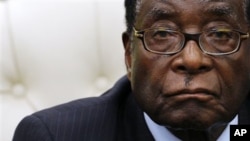South African mediators travel to Zimbabwe in the next few days amidst reports of increasing political violence and selective arrests in the country. Prime Minister Morgan Tsvangirai says security forces are violating their national mandate, and President Robert Mugabe’s ZANU-PF blocks reconstruction of Zimbabwe.
The Movement for Democratic Change, MDC, says that since the start of the year its supporters and civil society activists are being arrested on spurious charges as part of an increased harassment campaign against the party. Zimbabwe Lawyers for Human Rights says that it is currently dealing with more than 30 cases.
One of those arrests is legislator Douglas Mwonzora. He is the co-chairman of the parliamentary committee supervising the process of drafting a new constitution and was arrested outside parliament this week. His lawyers say he was taken more than 200 kilometers from Harare and that by late Thursday they had not had any access to him.
The MDC and rights lawyers say many of the arrests are coordinated by the Law and Order Department of the Zimbabwe Republic Police, which has frequently been accused of torture and selective arrests.
Human rights workers say the department, which operates in the capital Harare, gets its orders to arrest MDC personnel and supporters from Johannes Tomana, the pro-ZANU-PF attorney-general.
Morgan Tsvangirai, president of the MDC and prime minister in the inclusive government blames police for what he says are selective arrests. "The police, the army and the Central Intelligence Organization are all national security institutions created to protect Zimbabweans and not harm them. Over the past two years these institutions have shown no evidence of reforming," he said.
Regarding the arrests, police spokeman Wayne Bvudzijena said: "When people commit an offense they get arrested, so why are people committing offenses?" He said he could not comment on individual cases.
In similar instances in the past, the police have denied suggestions they arrest people selectively on trumped up charges. However, lawyers note that in such cases in the past, charges have been dropped or prosecutions have failed in the courts.
Speaking in Harare this week, Mr. Tsvangirai said people need confidence that the security forces have reformed. "They have failed to adjust to the realities of an inclusive society by refusing to let go of their partisan attitude which has eroded national confidence at a time when the people want assurance of their security well ahead of the next elections," he said.
Mr. Tsvangirai said when the inclusive government came to power two years ago it immediately began to improve people’s lives. "We managed to mitigate the appalling situation in which our nation found itself after a decade of failed policies and violent repression of the peoples will," he said.
Mr. Tsvangirai said ZANU-PF was only interested in staying in power and was disputing and blocking simple reforms. "Our ZANU-PF colleagues concentrate more on competition than collaboration, deliberately oblivious to the coalition government’s important role to have a common vision to build the economy, to build the people’s lives," he said.
In the last year there has been little progress in implementing 24 outstanding issues from the global political agreement which brought the inclusive government to power two years ago.
The agreement, guaranteed by the Southern African Development Community, appointed South Africa to mediate the Zimbabwe crisis.
Zimbabwe political analyst Brian Raftopoulos said this week that South African mediation is not doing well at present.
The three South African mediators are due in Harare in the coming days and will hear from MDC representatives that there has been no progress on the 24 outstanding issues Mr. Mugabe agreed to implement at a SADC summit seven months ago.
Mr. Mugabe later said that some outstanding issues would not be implemented until western restrictions against himself, his ZANU-PF colleagues and 31 mostly state-owned companies were lifted.









